| Srl | Item |
| 1 |
ID:
182893
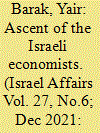

|
|
|
|
|
| Summary/Abstract |
From the Zionist movement’s early days, it mobilised scientific and technical knowledge in order to implement its goals. Economists were also recruited for this mission, but not as decision-makers; they agreed with the political decision makers’ goals and policies and were involved in their implementation. The economists’ secondary status lasted up until the 1980s, when they helped to overcome the hyper-inflation crisis. They were mobilised to back the politicians, who implemented an unusual heterodox massive stabilisation plan. Its success became the economists’ springboard for massive political-economic influence. It was only after the program’s success, that their economic position gradually became central. Their position became dominant in the 1990s, after the politicians implemented privatisation, which opened up the neoliberal era in Israeli socio-economic policy. The political echelon accepted the neoliberal ideology as framework, while the economists actually applied it.
|
|
|
|
|
|
|
|
|
|
|
|
|
|
|
|
| 2 |
ID:
182896
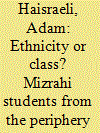

|
|
|
|
|
| Summary/Abstract |
This article explores how Mizrahi students from Israel’s periphery, first-generation students of higher education, describe the meaning of the categories of ethnicity and periphery on their path to academe. The data were drawn from in-depth interviews with 25 students, born to two Mizrahi parents, who grew up in the country’s periphery. The findings indicate clearly that the ethnic-Mizrahi discourse has been replaced by a class-periphery discourse. They also show that the main agent of the students’ acquisition of quality pre-academic education and higher education was not school but rather the parents.
|
|
|
|
|
|
|
|
|
|
|
|
|
|
|
|
| 3 |
ID:
182895


|
|
|
|
|
| Summary/Abstract |
The share of international tourists visiting Israel independently is continuously increasing, and is expected to blossom when the depressed COVID-19 air travel picks up as it enables people to avoid exposure to large groups. This article explores the patterns and characteristics of independent tourism in Israel with a focus on the method and timing of the various services purchased and the level of satisfaction derived from the purchase processes. By way of doing so, it uses a holistic approach that combines questionnaire with interviews – a unique method in the study of independent international tourism.
|
|
|
|
|
|
|
|
|
|
|
|
|
|
|
|
| 4 |
ID:
182892
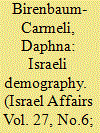

|
|
|
|
|
| Summary/Abstract |
With a fertility rate twice higher than the OECD average, Israel is a world outlier in terms of fertility. This article puts together a composite portrait of this exceptional reproductive landscape. Within a comparative framework, it offers context-specific illustrations showing that considered vis-à-vis women in the Former Soviet Union (FSU) and Jewish FSU immigrants to the U.S., FSU immigrants to Israel had higher fertility. Inside Israel, all non-Jewish women have decreased their fertility rate in the past two decades, whereas Jewish women of all strata, but ultra orthodox women, have increased their fertility rate. Given the material challenges of child-rearing in Israel, the article concludes with some questions and preliminary answers regarding Israel’s exceptional fertility rates.
|
|
|
|
|
|
|
|
|
|
|
|
|
|
|
|
| 5 |
ID:
182891
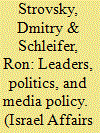

|
|
|
|
|
| Summary/Abstract |
The Russian media frequently wrote about Israeli Prime Minister Benjamin Netanyahu (1996–99, 2009–21), analysing his role in Middle Eastern affairs, especially with regard to Palestinian-Israeli relations, the Syrian civil war, and the Iranian nuclear programme. Examining Netanyahu’s image in the Russian press is crucial not only for understanding the political priorities of twenty-first-century Russian media but also for investigating Moscow’s role in international politics given its keen interest in the Middle East.
|
|
|
|
|
|
|
|
|
|
|
|
|
|
|
|
| 6 |
ID:
182897


|
|
|
|
|
| Summary/Abstract |
Israeli PM Ehud Olmert (2006–9) offered the Palestinians the most comprehensive peace deal they had ever received. Palestinian Authority President Mahmoud Abbas said he would reply ‘soon’ and never did. This interview records Olmert’s thoughts on the Israeli-Palestinian peace process and his own attempts to end the bitter conflict.
|
|
|
|
|
|
|
|
|
|
|
|
|
|
|
|
| 7 |
ID:
182898


|
|
|
|
|
| Summary/Abstract |
The establishment of the State of Israel symbolised the beginning of a new era in the relationship between Muslims and Jews and sparked a religious conflict that has continued to date. This article examines the main precepts underlying the rejection of the idea of Jewish statehood/nationhood by the Muslim Brotherhood, perhaps the largest and most influential Islamist movement in the post-World War I era.
|
|
|
|
|
|
|
|
|
|
|
|
|
|
|
|
| 8 |
ID:
182894
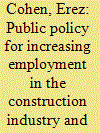

|
|
|
|
|
| Summary/Abstract |
This article examines public policy aimed at planning the domestic housing market and regulating employment in the construction industry, as formulated and implemented in Israel in light of the rapid rise in domestic housing prices. It shows that despite their awareness of the growing discrepancy between supply and demand and its impact on housing prices, policymakers acted mainly to suppress the demand instead of speeding up the pace of construction so as to increase the supply of houses. The article concludes with a number of recommendations of ways to increase the number of workers in the construction industry as a means to reducing housing prices.
|
|
|
|
|
|
|
|
|
|
|
|
|
|
|
|
| 9 |
ID:
182899


|
|
|
|
|
| Summary/Abstract |
This article presents the position towards Jews, Judaism, and the State of Israel of Sheikh Dr. Ahmad al-Raysuni, the Moroccan scholar who is the current president of the International Union of Muslim Scholars (IUMS). It discusses Raysuni’s legal rulings on normalisation and peace agreement with Israel, as well as his pragmatic legal opinion about Muslims living in Israel. The latter is contrasted with that of the former president of the IUMS, Sheikh Yusuf Qaraḍawi.
|
|
|
|
|
|
|
|
|
|
|
|
|
|
|
|
| 10 |
ID:
182900
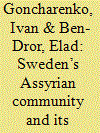

|
|
|
|
|
| Summary/Abstract |
This article examines attitudes within Sweden’s Assyrian community towards Israel, based on responses to a Swedish-language questionnaire distributed via the community’s electronic mailing list. The emergent picture is one of strong sympathy for the Jewish state, seen by respondents as a shining example of national self-determination based on the ingathering of the exiles – a dream nurtured by the world-dispersed small Assyrian nation. In addition, due to their deep animosity towards Turkey and the Arab states on account of their centuries-long persecution of the Assyrians, Swedish Assyrians tend to favour Israel in its feud with the Palestinians.
|
|
|
|
|
|
|
|
|
|
|
|
|
|
|
|